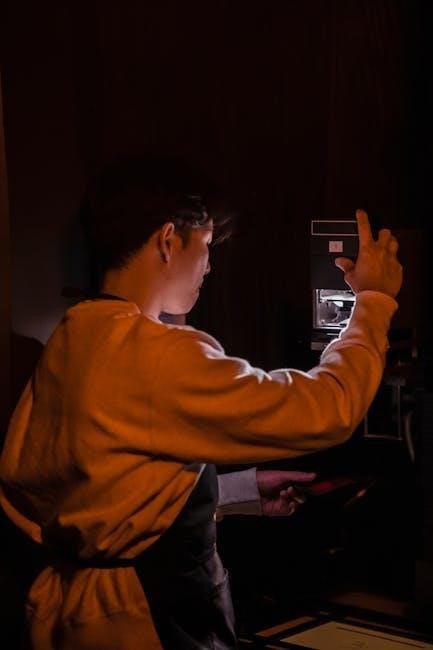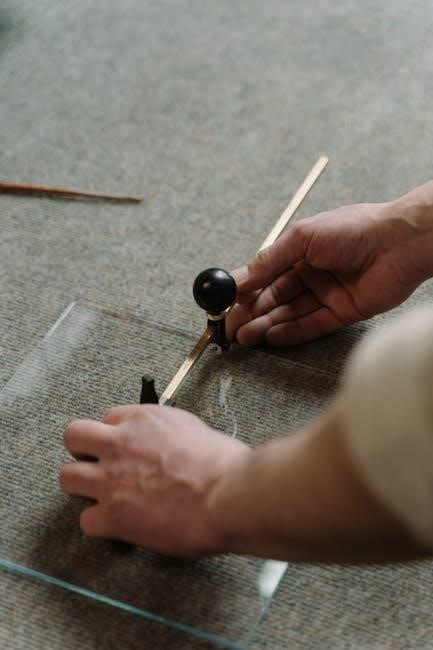Overview of the Gottman Method
The Gottman Method is a research-based couples therapy approach developed by Drs. John and Julie Gottman, focusing on improving relationships through core principles like building love maps, sharing fondness, and turning toward each other.
Core Principles and Research-Based Approach
The Gottman Method is rooted in decades of research on thousands of couples, offering a scientifically validated approach to understanding and improving relationships. It emphasizes emotional intelligence, bidirectional communication, and the importance of fostering a positive emotional climate. By focusing on measurable aspects of interaction, such as trust, intimacy, and conflict resolution, the method provides a clear framework for assessing and enhancing relationship dynamics. The approach is grounded in Dr. John Gottman’s groundbreaking studies, which identified key predictors of relationship success and failure, enabling couples to build resilience and strengthen their connection through evidence-based strategies.
Sound Relationship House Theory
The Sound Relationship House Theory is a foundational framework of the Gottman Method, conceptualized by Dr. John Gottman. It consists of a multitiered structure representing the essential components of a healthy relationship. The theory includes seven key elements: building love maps, sharing fondness and admiration, turning toward each other, a positive perspective, managing conflicts, making life dreams come true, and creating a shared meaning. Each level of the “house” builds upon the previous one, ensuring a strong foundation for emotional connection, trust, and lasting intimacy. This theory provides a clear, evidence-based roadmap for fostering and maintaining fulfilling partnerships.

Key Components of the Gottman Method
The Gottman Method focuses on three core components: building love maps, sharing fondness and admiration, and turning toward each other. These practices foster emotional connection and intimacy.
Build Love Maps
Building love maps is a cornerstone of the Gottman Method, emphasizing the importance of understanding your partner’s inner world. This involves knowing their thoughts, feelings, desires, and daily experiences. By actively seeking to understand each other, couples strengthen their emotional connection. Dr. John Gottman suggests that love maps are built through intentional conversations, where partners share details about their lives, hopes, and fears. Regularly updating these maps helps prevent emotional disconnection and fosters intimacy. This practice ensures that partners remain attuned to each other’s needs, creating a foundation of trust and understanding in the relationship. Regular attention keeps love maps vibrant.
Share Fondness and Admiration
Sharing fondness and admiration is a vital component of the Gottman Method, fostering a positive emotional climate in relationships. Dr. John Gottman emphasizes expressing appreciation and respect for one another, which strengthens connection and intimacy. This practice involves actively acknowledging and celebrating each other’s strengths, achievements, and qualities. Regularly sharing fondness helps couples maintain a positive perspective, even during challenges. It also counteracts negativity and prevents feelings of contempt. Simple acts, like expressing gratitude or admiration, can reignite affection and ensure both partners feel valued. This practice is foundational for building resilience and ensuring a lasting, fulfilling relationship. Regular expressions of fondness nurture emotional closeness.
Turn Toward Each Other
The Gottman Method emphasizes the importance of turning toward each other to strengthen emotional connections. This principle involves actively responding to bids for attention, affection, or support from your partner. By turning toward, couples build intimacy, trust, and a sense of safety in their relationship. Ignoring or turning away from these bids can create distance and dissatisfaction. Dr. Gottman’s research shows that consistently turning toward each other predicts high relationship satisfaction. Simple gestures, like engaging in conversation or showing interest, can deepen your bond. This practice fosters a culture of responsiveness, ensuring both partners feel seen, heard, and valued. Regularly turning toward each other cultivates a resilient and fulfilling connection.

The Seven Principles for Making Marriage Work
The Seven Principles for Making Marriage Work are research-based strategies by Dr. John Gottman to strengthen relationships. They include enhancing love maps, nurturing fondness, and turning toward each other to build a lasting, fulfilling connection.
Enhance Love Maps
Enhancing love maps involves deeply understanding your partner’s inner world, including their thoughts, feelings, and experiences. This principle, part of the Gottman Method, emphasizes the importance of staying attuned to your partner’s life, desires, and stresses. By regularly updating and expanding your knowledge of each other, couples build a strong foundation of emotional intimacy. This practice fosters connection and ensures that both partners feel seen and understood. Activities like sharing daily events, exploring aspirations, and discussing challenges help keep love maps accurate and vibrant, strengthening the bond between partners and nurturing a lasting, fulfilling relationship.
Nurture Fondness and Admiration
Nurturing fondness and admiration is a cornerstone of the Gottman Method, emphasizing the importance of maintaining a positive emotional connection. Couples are encouraged to regularly express appreciation, respect, and affection for one another, fostering a culture of warmth and gratitude. This practice helps counteract negativity and prevents resentment from building. By focusing on the qualities that initially attracted them to each other, partners strengthen their bond and create a resilient relationship. Small gestures, such as compliments or acts of kindness, can reignite fondness and admiration, ensuring the relationship remains vibrant and fulfilling over time.
Turn Toward Instead of Away
Turning toward each other is a vital principle in the Gottman Method, emphasizing the importance of emotional responsiveness. When partners “turn toward,” they engage with each other’s bids for connection, fostering intimacy and trust. This practice contrasts with “turning away,” which can lead to emotional disconnection and resentment. By actively choosing to respond to each other’s needs, couples strengthen their relationship and build a sense of togetherness. This approach helps create a supportive environment where both partners feel valued and heard, promoting long-term relationship satisfaction and resilience.

Practical Exercises and Tools
Gottman Method offers exercises like the Gottman Island Survival Game and Processing a Previous Emotional Injury, helping couples connect emotionally, resolve conflicts, and strengthen their relationship through guided activities.
Gottman Island Survival Game
The Gottman Island Survival Game is a fun, interactive exercise designed to foster connection and understanding between partners. Couples are presented with a hypothetical scenario where they must rank essential items for survival on a deserted island. This activity encourages open communication, collaboration, and empathy, helping partners gain insight into each other’s priorities and values. By exploring each other’s perspectives, couples strengthen their emotional bond and learn to navigate conflicts effectively. This tool, part of the Gottman Method, promotes teamwork and intimacy, offering a lighthearted yet meaningful way to deepen relationship understanding and connection.
Processing a Previous Emotional Injury
Processing a Previous Emotional Injury is a therapeutic exercise designed to address unresolved conflicts and hurtful incidents in a relationship. Couples are guided to revisit past wounds in a structured, safe manner, focusing on understanding rather than blame. The goal is to create emotional healing by fostering empathy, apologies, and mutual comprehension. This exercise helps partners rebuild trust and intimacy, transforming past hurts into opportunities for growth. By addressing these injuries, couples can move beyond resentment and strengthen their emotional connection, aligning with the Gottman Method’s emphasis on repairing and enhancing relationships through meaningful communication and empathy.

The Role of John and Julie Gottman
John and Julie Gottman are pioneers in relationship science, collaborating to develop the Gottman Method, a research-based approach to couples therapy. Their work has transformed relationships globally.
John Gottman’s Pioneering Research
John Gottman’s groundbreaking research revolutionized relationship science by studying thousands of couples in his “Love Lab.” His work identified predictors of divorce and factors fostering lasting relationships. Gottman observed how couples interact, focusing on emotional connection, conflict resolution, and affection. He introduced concepts like the “Four Horsemen” of divorce and the importance of “turning toward” each other. His findings, detailed in works like The Seven Principles for Making Marriage Work, laid the foundation for the Gottman Method. By blending scientific rigor with practical insights, Gottman’s research continues to empower couples and therapists worldwide, offering evidence-based tools for relationship renewal and strength.
Julie Gottman’s Clinical Contributions
Julie Gottman, a clinical psychologist, has significantly advanced the Gottman Method by translating research into practical therapeutic tools. Her work emphasizes emotional connection and intimacy, providing couples with actionable exercises like the “I Appreciate” activity. Julie’s contributions include developing workshops and resources that help therapists implement Gottman principles effectively. Her focus on the clinical application of the Gottman Method has made it accessible to a broader audience, enhancing its impact on relationship therapy. By bridging research and practice, Julie Gottman continues to support couples in building stronger, more resilient relationships.